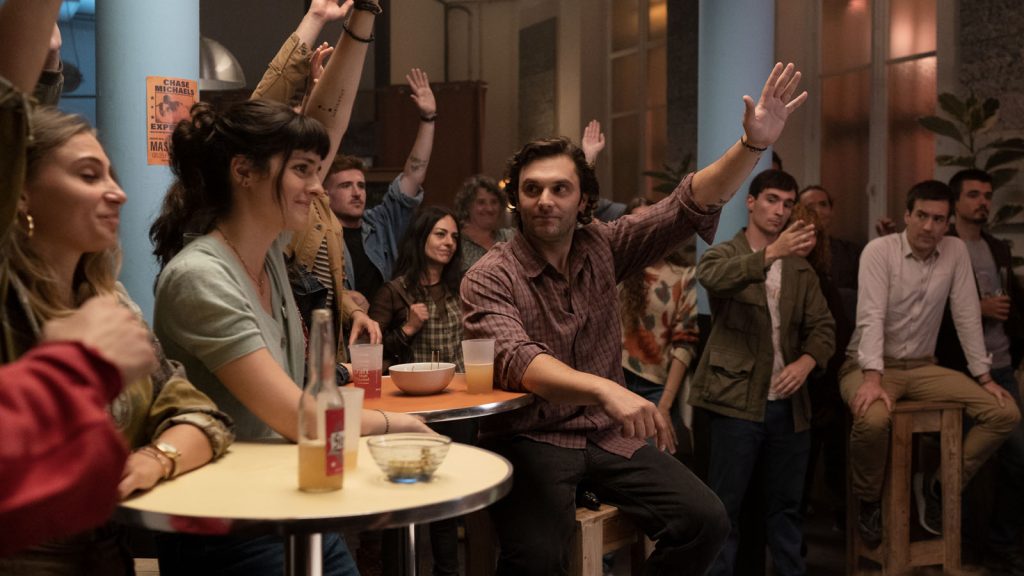
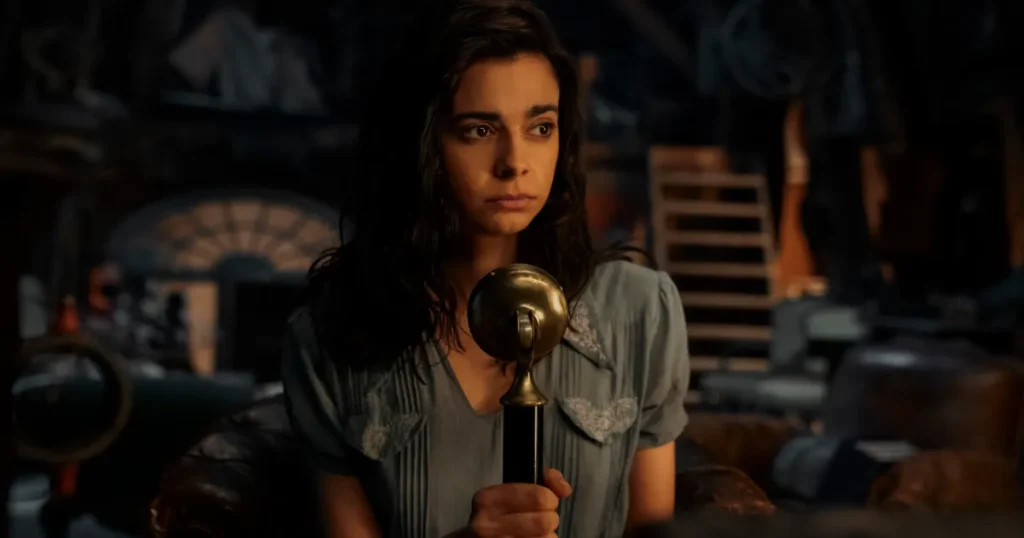
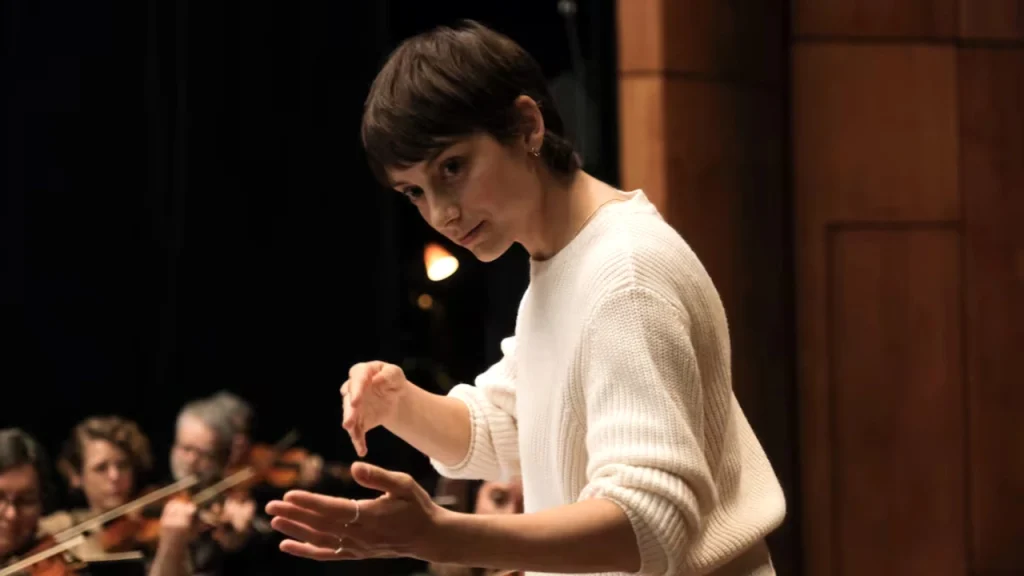





By Anne Brodie
A Difficult Year from writer-directors Olivier Nakache and Éric Toledano takes a comedic tongue-in-cheek look at two middle-aged guys, Bruno (Pio Marmaï) and Albert (JonathanCohen) both in dire financial straits when we meet them. A Difficult Year is a comedy about poverty that pokes fun at wokeness and then rights its course. It’s true, everything is difficle. Bruno comes to sell a stolen TV (taken when a climate change rally goes wrong) to Albert who is busy trying to commit suicide. He recovers and the two realise they have a lot in common, hopeless debt, inability to make money, and a childish dream that everything will be okay, that the French government will save them with debt forgiveness. Meanwhile, they eat free food at rallies while pretending to support causes providing food, and looking for better menus at other meetings. Bruno and Cactus (Noémie Merlant) the leader of a climate change, anti-consumption group are attracted to one another. She has no idea he’s homeless, with a low-level job at the airport where he sleeps; he’s perfected a middle-class image with borrowed clothes. Albert loves nothing more than taking risks to better his situation. Both of them take a debt control class from a guy who gambles on the side (Mathieu Amalric) but ignore it all. They plan to pull off a stunt so wild, dangerous, and illegal, that, by now we’re fond of them and want them to succeed. A Difficult Year is bracing, buoyant and imaginative, and timely touching on pressing issues of the day including our economic well-being, all with a wink and a nod. TIFF – Sept 14 Scotiabank Theatre
Netflix brings the highly anticipated All the Light We Cannot See to TIFF’s Primetime program. The series based on Anthony Doerr’s Pulitzer Prize-winning novel follows a blind French girl Marie-Laure (Aria Mia Loberti ) as she’s stalked by a sadistic Nazi officer who believes she has something he wants – the Sea of Flames diamond. Her father Daniel (Mark Ruffalo) prepared her well for life in a sighted world, recreating a tiny wooden version of St. Malo, now occupied. He and her uncle (High Laurie) have disappeared. Marie-Laure broadcasts illegally, risking death, and ironically forges a bond with a young idealistic Nazi officer tasked with erasing “foreign” radio. Directors Shawn Levy and written by Steven Knight recreate the French town as it was during the WWII occupation, and the moral currents running through it – German soldiers, knowing they will likely die when American bombers arrive, try to escape and turn against one another, weakening themselves and pushing officers into madness. The four-parter screens September 14 and 16 at Scotiabank Theatre before bowing on Netflix Nov 2.
Days of Happiness / Les jours heureux from writer-director Chloé Robichaud stars Sophie Desmarais as Emma, a renowned symphony conductor as she nears a personal boiling point. Her work is acclaimed, she’s played around the world but is ready to take a contract in her hometown and make it permanent. Her agent and father Patrick (Sylvain Marcel) has managed her from the beginning; he’s tough, territorial, and a strong deal-maker but she’s beginning to tire of his possessiveness as well as his bullying. Patrick’s mother dies and it barely registers with him. What kind of monster is he? Her lover, cellist Naëlle (Nour Belkhiria), and her little boy offer safe haven but when Emma demands (as her father would) that they move in together, she’s rejected. Her mother Sabrina (Maude Guérin) is frightened of her husband’s temper and beatings, reviving Emma’s painful memories of being dominated by him throughout her life. The tension between father and daughter drives the story at a crucial time as the symphony decides whether to keep her or not. He’s making ludicrous demands of them and of Emma which she knows are hurting her chances. The symbolic, subtle war for survival between them is pathetic but Emma understands more about herself now. A fascinating story that works as a psychological fable and offers up a glorious programme of music too. Maestro Yannick Nézet-Séguin, principal conductor and artistic director of the Metropolitan Orchestra, musical director of the Metropolitan Opera of New York, and the Philadelphia Orchestra, served as the film’s musical consultant while the Metropolitan Orchestra collaborated both in recording musical pieces and filming the movie. TIFF TONIGHT at Scotiabank Theatre.
Woodland stars Brigitte Hobmeier, luminous as a woman retreating to her late grandparents’ farm after witnessing a terrorist attack in Vienna. Marion, Journalist of the Year, has ceased coping, leaves her husband behind, and heads to the place she hasn’t been in twenty years. It’s decrepit, unheated, and it’s deep winter. The local farming population and her childhood best friends Gerti and Franz (Gerti Drassl and Johannes Krisch) bear deep grudges against her and threaten her. Among her sins, writing disparaging articles about farmers and failing to attend her parents’ funerals. Meanwhile, she hunts for food, chops wood, and experiences horrific flashes of the attack. Gerti eventually comes around and they renew that long-lost sisterhood and she protects her from her father’s frequent attacks. Her husband drives to the remote village but Marion won’t go back to the city. Hobmeier appears without makeup, hair askew, and wearing her grandparents’ clothes, and her soul shines through with radiance, fortitude, and independence. TIFF – TODAY at Scotiabank Theatre.
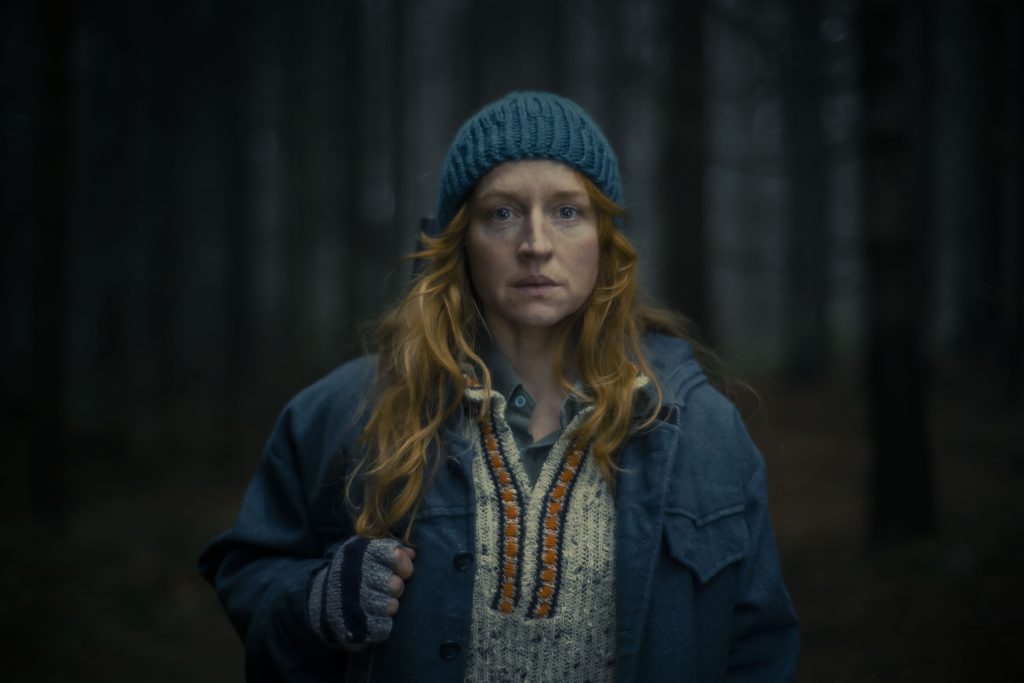
Sandra Hüller’s landmark performance in Justine Triet’s Anatomy of a Fall is a stunner. This is the one other actors may look to for lessons on profound realism and naturalism. Her work as Sandra, a married writer, and mother of a son living high up in the French Alps throbs with essential human spirit as she navigates the sudden, mysterious death of her husband Samuel (Samuel Theis). Their young legally blind son Daniel (13-year-old Milo Machado Graner in a surprisingly mature performance) finds his body in a pool of blood under the third-floor peak of their chalet and is the sole witness based on what he heard. Sandra tells police it was suicide but they don’t buy it and she’s indicted. The investigation reveals a troubled, violent marriage, but she insists his death wasn’t her doing. Suspense, disbelief, and shock as police, friends, and associates as Daniel and Sandra answer questions; dramatic courtroom scenes are dialed up to excruciating intensity and change our early opinion of her. The depths and complexity of the story and the personalities are staggering. Rest assured that the film may be the best 2.5 hours you’ll spend in a theatre this TIFF. It premiered last night but screens today Sept. 8, Scotiabank Theatre. (Anatomy of a Fall won the Cannes 23 Palme d’Or for best film).
Magical, gritty, wondrous, and criminally intriguing. Alice Rohrwacher’s Le Chimera has real style, harking back to the New Wave and all those fabulous films that came out of Italy in the 50s, 60s, and 70s. Hélène Louvart’s cinematography (35mm, Super 16, and 16mm) is careful and incisive, creating mysteries with unexpected, effective angles, movements, and little surprises along the way. Rohrwacher’s uncomfortable and beautiful portrait of men in trouble and loving it involves the world of antiquities lying underground, underwater, in unexpected tunnels and graves. Josh O’Connor is Arthur, an English grave robber working with fellow thieves in Tuscany, Italy. No surprise that there are apparently vast stores of ancient hidden treasures “not meant for human eyes” hidden from view and forgotten in that art-obsessed country. Tokens, artifacts, gems, statues, and reliquaries filled with amulets ward off evil for the person buried. Priceless – to be sold off to the highest bidder who ignores the source and the crime. Arthur’s aunt (Isabella Rossellini) allows him to live in her shed, despite her big, empty house. Funny scene in her salon when a group of red-haired women relatives show up to complain and enquire about her will and property. So many scenes of visual and thematic delight, such joy to be had contrasting with the black-hearted cruelty of grave robbing, the exquisite items they recover, and even the police showing up is quirky. Arthur’s story is told with great delicacy. And you’d swear the film was made fifty years ago. A jewel, a treasure. Sept. 12 TIFF Bell Lightbox and Sept. 14 Scotiabank.
Atom Egoyan revisits opera in his latest feature Seven Veils, the story of Jeanine (Amanda Seyfried) tasked with restaging Salome originated by her late, long-ago mentor. Richard Strauss’ 1905 production, based on Oscar Wilde’s play, is shockingly violent; Salome is an ancient ruler’s daughter who loves John the Baptist. When he doesn’t return it, she performs a sensual dance for him, and in order to kiss his lips, causes an unforgivable act. Jeanine’s passionate about the opera and honouring her mentor, but also about giving it her own signature. The company and her mentor’s widow demand she desist and return to his iteration. Scenes on and backstage during rehearsals are intercut with aged footage of a young blonde girl in a field, swinging on a swing and eating oranges as someone operates the camera. That person’s focus becomes personal and oddly unsettling, but why? Meanwhile, Jeanine deals with her husband’s open affair with her mother’s (Lynne Griffin in very brief but powerful moments) caregiver and ongoing frustration with the limitations under which she’s working. Clea, the props person (Rebecca Liddiard) is sculpting St. John the Baptist’s head for the dramatic finale scenes but as she prepares the actor (Michael Kupfer-Radecky) for the clay application, is sexually assaulted. Disturbing scenes of sexual violence onstage and off, past and present hang over us, the dark sense of pain and secrets. Egoyan’s complex piece is worthy and showcases his love of the one-act opera which he has staged live twice prior to making the the film. TIFF – Sept. 10 Visa Screening Room at the Princess of Wales Theatre.
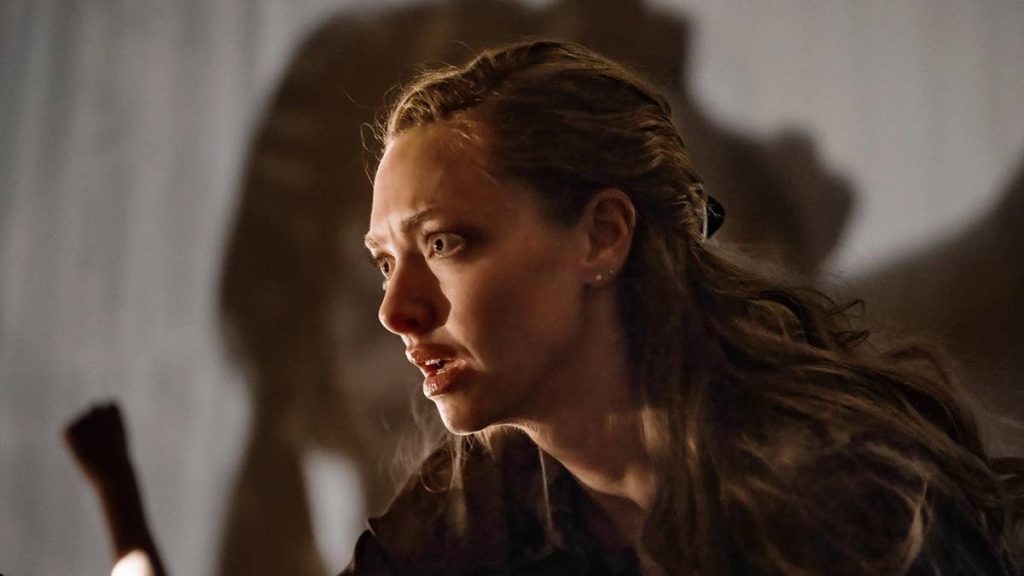
Writer-director Kaouther Ben Hania’s innovative style brings to vivid, unforgettable life Four Daughters, a quasi-documentary about a family of Tunisian women mourning the disappearance of the eldest two daughters who were “devoured by wolves”. Ben Hania has the real mother Olfa and her two youngest Eya and Tayssir (as themselves), the missing ones Ghofrane (Ichraq Matar) and Rahma (Nour Karoui), and Olfa (as herself, with actor Hend Sabri also standing in) and Majd Mastoura bravely symbolising the “disappointing men” that have let them down again and again. The remaining family members walk us through the abuse, rapes, beatings, and their rising anger and confusion dealing with the new regime following Ben Ali’s ouster, and the fate of the missing girls. The actors who play the missing girls struggle to understand the pain the family faces every day, all against the backdrop of deep distrust of men and boiling anger. TIFF – Sept. 14 at Scotiabank Theatre.
The Teachers’ Lounge from director Ilker Çatak confirms that the road to hell is paved with good intentions. Carla (Leonie Benesch) is an effective grade school teacher with the respect of her students and the ability to de-escalate problems with ease. She’s a paragon of duty and calm, irreproachable. Someone in the school is stealing money and supplies and suspicion falls on an immigrant boy whose father says if he stole anything he’d break his legs. Carla happens to leave her computer open on a video conference and records a person in the act of reaching into her forgotten wallet and taking her money. It’s just an arm but the person’s blouse is distinctive; she tracks down the school secretary – an unlikeable woman – and asks her to give the money back and she’ll let the matter drop. The woman neither confirms nor denies and shouts abuse, leaving Carla reeling; she takes it to the headmistress. Meanwhile, a student is in full rebellion, refusing to cooperate. Carla has wars on two fronts, and then the other teachers get involved. Beautifully written with a flawless, heightened by Benesch’s regal performance as a moral mainstay suddenly faced with ugly events for which she is ill-equipped. Joy in the classroom and gym turns to brutality as this strange malaise falls over the school. Also stellar is young Vincent Stachowiak as Tom, the courageous young Tom. Brilliant. TIFF – Sept. 12 and 13 Scotiabank Theatre.
Writer/director Billy Luther’s narrative feature debut Frybread Face And Me is a triumph. It’s a remarkable artistic and thematic journey back in time to when we were eleven, strongly reviving those innocent feelings. Young Keir Tallman is Benny, a Navajo living with his out-of-sorts mother and father in San Diego. He’s packed off to stay the summer with his grandmother (Sarah H. Nataniin a terrific debut), wearing his beloved cowboy hat and Fleetwood Mac T – his fave band – and expecting the worst. She refuses to speak English, lives on an isolated Arizona desert farm sans internet, plenty of chores, and a bad-tempered uncle. Unfortunately, Benny’s load is lifted with the arrival of his cousin Dawn aka Frybread Face (Charley Hogan) a kindred spirit who names him Shamu because he’s from San Diego where her beloved never-seen Shamu the whale lives. They horse around, get into scrapes, tease one another, and learn from Grandma who teaches them the history, meaning, and method of weaving a carpet, and living simply off the land. It’s his introduction to the traditional indigenous life he’s never known and he’s embracing it; he even shears sheep. Frybread Face And Me is simply a beautiful helping of magic, gentle learning, humor, and the absolute importance of family. And bonus – it’s suitable for the whole family. Executive produced by Taika Waititi. Sept. 11 and 13 at Scotiabank Theatre Toronto.
Canadian-born writer-director Molly McGlynn paints an engaging and honest portrait of sixteen-year-old Lindsay (Maddie Ziegler) in Fitting In, as she navigates high school, boys, and her single mom (Emily Hampshire) like most teens. She’s a loving daughter and an empathetic friend, but still doesn’t have her period. A brusque male doctor diagnoses her with MRKF syndrome, she was born without a vagina and womb, turning her life plan to ash. Her mother is pained for her but keeps an even keel, while Lindsay undergoes various stretching exercises and considers surgery. She’d just begun a chaste romance with Adam (Canadian Reservoir Dogs star, D’Pharaoh Woon-A-Tai ) and panics when the possibility of sex arises. Her new non-binary friend Jax (Ki Griffin) supports her and they have a brief romantic interlude, but Lindsay’s really struggling. She drinks too much at a party one night and lets her diagnosis slip and then must face school- news travels fast. The movie’s brilliantly subversive, upending sexual assumptions and stereotypes with wit, humor, and great courage. It’s refreshing to see such intimate material handled with the care and grace it deserves, allowing it to become a rallying cry for young people. A real joy. Janelle Monáe is an executive producer. TIFF – Sept. 9 Scotiabank Theatre and Sept. 12 Lightbox.
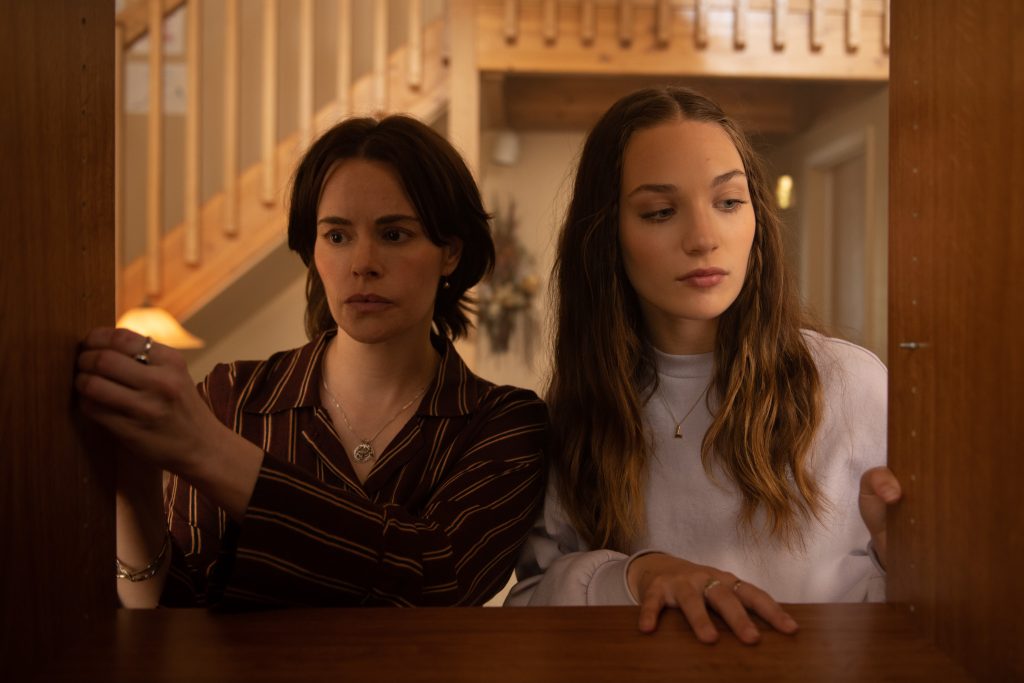
TIFF So where do I start with The Feeling That the Time for Doing Something Has Passed? It’s an unusual little number, written, directed, edited by, and starring Joanna Arnow in her debut feature. Funny in a weird way that dares us to smile or feel good, it’s subversive on a lot of levels, a soft sell on her experiences as a dating app “submissive” while she is strong-willed, and knows what she wants. She has many, many sexually dominant male friends whose demands range from, well, I’m too polite to say, to wearing a F***Pig costume and oinking. While it’s subversively funny and witty, and I’m a grownup and know about BDSM, some of the demands made by men, especially her long-termer, Allen (Scott Cohen) just tick me off. Hey, she doesn’t mind. I salute Arnow for her bold, outsider march against conformity, this warm and weird couple of hours, and for taking an off-limits lifestyle centre stage. Looking forward to her next one. TIFF – Sept. 9 and 10 at Scotiabank Theatre.
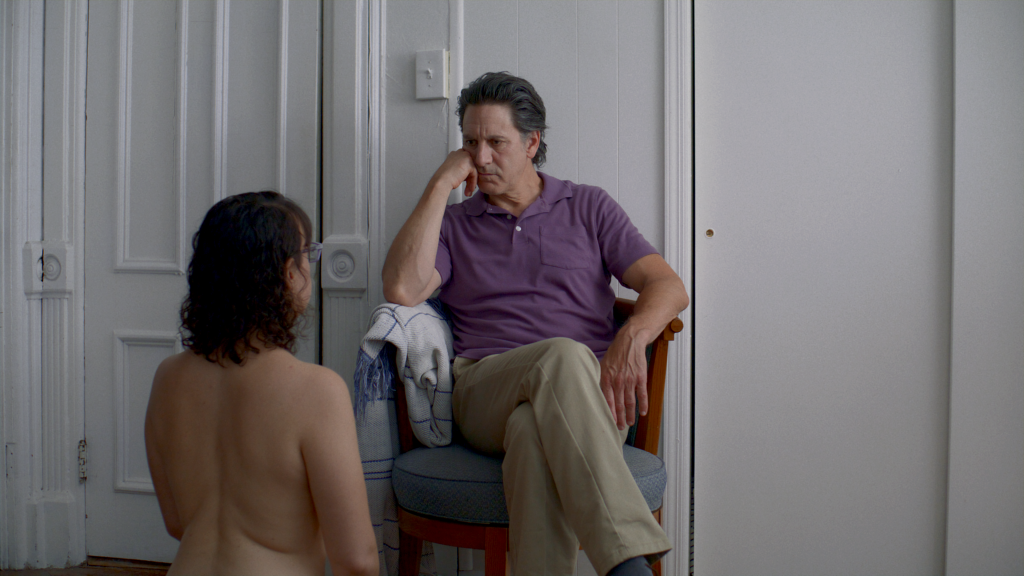
Toronto filmmaker Jen Markowitz’s doc Summer Qamp takes us to Camp fYrefly in Alberta to spend time with teenaged LGBTQ+2 kids spend a couple of weeks among soul sisters and brothers, where they won’t face bullying, discrimination, or the feeling of “otherness”. Markowitz starts at the beginning, interviewing kids in their homes as they prepare to leave home – queer, non-binary, and trans teens share their discovery journey of who they are, and what they hope the camp will bring them. Most state that their discovery of who they are was early and complete; it was fitting into peer society that was difficult. Once at camp, the comradeship begins to sink in and they feel safe and accepted while enjoying all the usual summer camp activities – archery, swimming, hiking, campfires, dances, and conversation. Some need time to understand that they are in a safe place, and their demeanor changes, allowing them to experience the joy of these kids being together in unity and fellowship, guided and cared for by like-minded adults. The doc brings us insight and allows us to feel their joy. TIFF – World Premier Sept. 9 at Scotiabank and Sept. 10 also at Scotiabank.
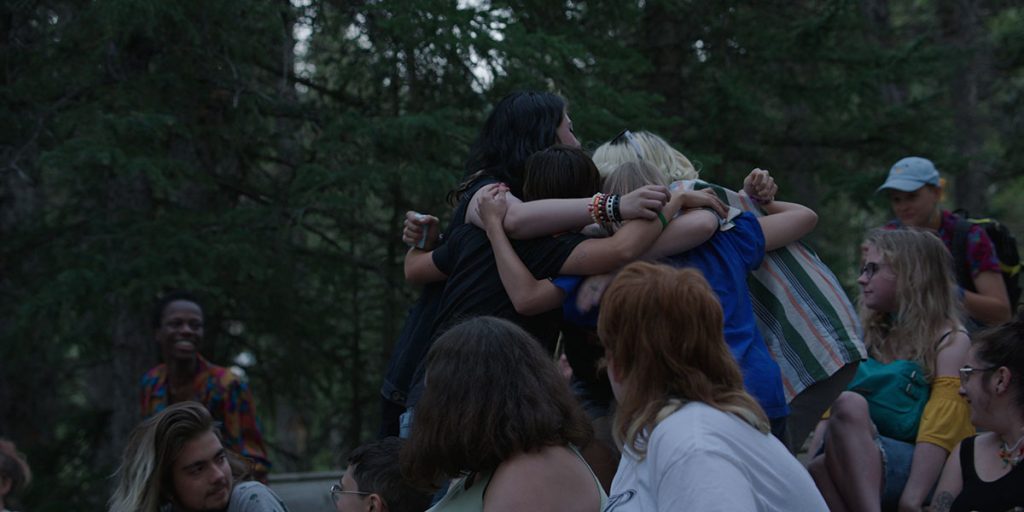
TIFF – The Royal Hotel, a thriller and second collaboration between filmmaker Kitty Green and Jullie Garner after The Assistant, further explores, to a devastating climax, the same kind of female on high alert tale. A woman must fend off chauvinists who will stop at nothing to prove their power and dominance. The patriarchal world is a trap; it’s their job to survive and thrive. Garner plays Hannah, and Jessica Henwick is Liv, two Canadians on a globe-trotting adventure, who run out of money on a party cruise and must leave and take work. All that is available to them is barmaid jobs in a remote desert hotel/pub in South Australia where they’re told to expect “male attention”. Their hands are tied and they take it, and find they were told the truth. New girls at the bar are advertised outside as “Fresh Meat” and that’s exactly how they’re treated. They’re disgusted by the local patrons, male and female, who drink a lot, act out, strip, dance on the bar, and harass the Canadians. The girls keep their cool and begin to relax, as we do for them, smiling and fitting in when, like whack-a-mole, one after another male with boundary and alcohol issues gets a notion. Things take a scary, then very bad turn in this keenly observed survival thriller. Sept. 11 Roy Thomson Hall and Sept. 13 Scotiabank Theatre.

Reese Witherspoon and Jennifer Aniston return to hand us another great season of the best TV news drama in recent times, in its third season. The Morning Show on AppleTV+ offers more excellent writing and performances, as we follow the anchors into the boardroom, bedroom, newsroom, and edit suites with that particular frantic newsroom vibe. Morning news, a competitive beast, is angry this season. Is it enough to send an anchor into space for ratings, to fend off or to encourage a sale of the entire kaboodle, to antagonize one another, or drink too much at a reception where you’re being honoured? When is it too much? Battered and bruised, Alex and continue to find comfort in one another as the network struggles financially, a great story turns sour in major fashion, as a tech billionaire (Jon Hamm) comes for UBS. And then a major hack. The series’ high level of excellence continues, keeping it timely, and entertaining while keeping the human heartbeat and the pressures of the news industry right out there. Quite the achievement.
Hulu‘s The Other Black Girl based on Zakiya Dalila Harris’ best-selling novel and starring Sinclair Daniel as Nella and Ashleigh Murray as Hazel is trippy, quasi-sinister fun! Nella, an aspiring editor at Wagner Publishing in New York, and a Harvard grad, is earning her keep with solid instinct, and an admirable work ethic, but feels some sting as the sole Black employee. Her boss Vera asks her to get coffee, print documents and such but not the others. Nella is given to paranoia and nightmares which creates that sinister vibe – what happened to her? She imagines that she is under video surveillance but relaxes when Vera suggests she may promote her. Wagner’s star author has written a new book and Vera asks her to read it through. She’s horrified by content she deems offensive to Black women and tells Vera, who won’t hear of it. The author – who saved the publishing house with his solid sales – visits and asks Nella what she thinks. She warns him it would be “dangerous” to publish without a professional “sensitivity read”. He’s furious and storms out. None of this is helped by the new hire, the “other Black girl” Hazel, who encourages her to speak her mind, and as we discover does more underhanded things to supplant Nella. Sinister. Even though she is always sorry and has a reasonable explanation. Nella forgives her and they crash a party via Hazel’s practiced deceit and manipulation. Nella doubts her own doubts about Hazel and the nightmares increase. And then Nella gets a Big Idea. This extraordinary ten-parter is electrifying at times, a psychological suspense that’s timely, relatable to office workers and creatives, and other humans found herein. Unendingly clever in its sinister glory, wildly entertaining and unnerving, suggesting rather bluntly that the workplace is dangerous. Psychologically wounding. You know, sinister. September 13